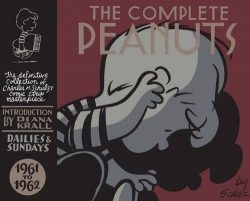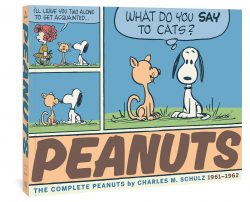

By Charles M. Schulz (Fantagraphics Books)
ISBN: 978-1-56097-672-1 (HB) 978-1-60699-949-3 (PB)
Peanuts is unequivocally the most important comics strip in the history of graphic narrative. It is also the most deeply personal. Cartoonist Charles M Schulz crafted his moodily hilarious, hysterically introspective, shockingly philosophical surreal epic for half a century: 17,897 strips from October 2nd 1950 to February 13th 2000. He died from the complications of cancer the day before his last strip was published…
At its height, the strip ran in 2,600 newspapers in 75 countries, translated into 21 languages. Many of those venues are still running perpetual reprints, as they have ever since his departure. Attendant book collections, a merchandising mountain and television spin-offs made the publicity-shy artist a billionaire.
None of that matters. Peanuts – a title Schulz loathed, but one the syndicate forced upon him – changed the way comics strips were received and perceived: proving cartoon comedy could have edges and nuance as well as pratfalls and punchlines.
Following Diana Krall’s Foreword – discussing past times and secular humanism – the timeless times of play, peril and psychoanalysis resume as ever in marvellous monochrome, with more character introductions, plot advancements and the creation of even more traditions we all revere to this day…
As ever our focus is quintessential inspirational loser Charlie Brown who, with increasingly fanciful high-maintenance mutt Snoopy, remains at odds with a bombastic, mercurial supporting cast, all hanging out doing kid stuff.
As always, daily gags centre on playing, musical moments, pranks, and a seasonal selection of sports; teasing, making baffled observations and occasionally acting a bit too much like grown-ups. However, with this tome, the themes and tropes that define the series (especially in the wake of all those animated TV specials) become mantra-like and endlessly variable.
Mean girl Violet, prodigy Schroeder, self-taught psychoanalyst and world dictator-in-waiting Lucy, her off-kilter little brother Linus and dirt-magnet “Pig-Pen†are fixtures perfectly honed to generate joke-routines and gag-sequences around their own foibles, but now another clutch of new disruptive players join the mob.
Moreover, Charlie Brown’s existential responsibility for baby sister Sally expands crushingly as she grows and he assumes the mantle of dumber, yet protective, big brother…
Resigned – almost – to being an eternal loser singled out by fate, Charlie is helpless in the clutches of relentless Lucy who monetises her spiteful verve via a 5¢ walk-in psychoanalysis booth – ensuring that whether at play, in sports, flying his kite or just brooding, the round-headed kid truly endures the trials of the damned…
Perpetually sabotaged, and facing face-to-face abuse from all females in his life. Charlie Brown now endures a fresh hell in the form of smug attention-seeking Frieda who demands constant approval for her “naturally curly hair†and champions the cause of shallow good looks over substance. Even noble Snoopy is threatened, as the newcomer drags – literally – her boneless, functionally inert – but still essentially Feline – cat Faron into places where cats just don’t belong!
Other notable events include a sinister escalation in the Blanket war as Lucy sadistically seeks ways to decouple Linus from the fabric comforter that sustains him in the worst of times…
Moreover, when she isn’t stealing, slicing, mutilating, interring or otherwise assaulting the cloth, Snoopy is there to fight the tormented kid for it. And worst of all, Linus is afflicted with the compulsion to collect things and diagnosed with a need to wear eyeglasses. Oh, the humanity…!
The bizarre beagle increases his strange development in all ways. Other than his extended Cold War duel for possession of the cherished comfort blanket, the manic mutt must adapt to that darn cat, but still finds time to philosophise, eat, dance like a dervish, stand on his head, converse with falling leaves, play with sprinklers, befriend birds, eat more, brave the elements and coin a bucketload of new slogans like “Happiness is a piece of fudge caught on the first bounceâ€â€¦
The Sunday page had debuted on January 6th 1952; a standard half-page slot offering more measured fare than 4-panel dailies. Thwarted ambition, sporting failures, explosive frustration – much of it kite-related – and Snoopy’s inner life became the strip’s signature denouements as these weekend wonders afforded Schulz room to be at his most visually imaginative, whimsical and weird…
Particular moments to relish this time involve the increasingly defined and sharply-edged romantic triangle of Lucy, Schroeder and Beethoven; Sally’s extended performance anxiety over starting kindergarten; Linus discovering the magic of a library card; the satisfaction of shoelace-tying; more “pencil-pal†communications; snow-games, rain, hiccups, stargazing ruminations; cooking gaffes; television, and grandeur and weirdness of Autumn.
There’s also slow-maturing madness through the first converts to the cult of The Great Pumpkin and the dread power of romance manifests with the return of Linus’ unattainable schoolteacher/inamorata Miss Othmar…
To wrap it all up, Gary Groth celebrates and deconstructs the man and his work in ‘Charles M. Schulz: 1922 to 2000’whilst a copious ‘Index’ offers instant access to favourite scenes you’d like to see again….
Readily available in hardcover, paperback and digital editions, this volume ensures total enjoyment: comedy gold and social glue metamorphosing into an epic of spellbinding graphic mastery that still adds joy to billions of lives, and continues to make new fans and devotees long after its maker’s passing.
The Complete Peanuts: 1961-1962 (volume Six) © 2006, 2014 Peanuts Worldwide, LLC. The Foreword is © 2006, Diana Krall. “Charles M. Schulz: 1922 to 2000†© 2006 Gary Groth. All rights reserved.
